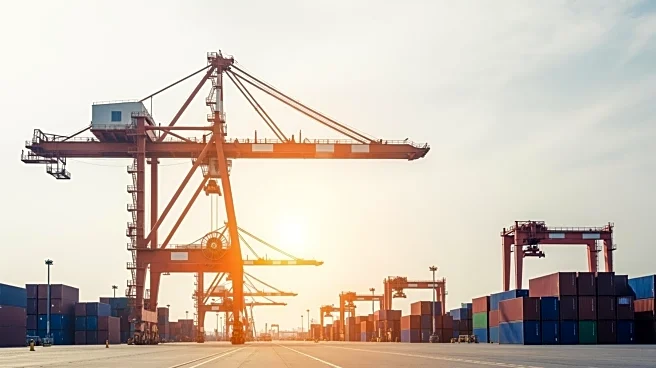What's Happening?
The Jacksonville Port Authority (JAXPORT) is experiencing significant growth in its operations, particularly in the dry bulk sector, which is crucial for Florida's infrastructure development. The port
has seen a 60% increase in dry bulk throughput between 2022 and 2023, driven by the import of stone and aggregates used in highway construction and housing projects. Companies like Martin Marietta and Cemex are key players at JAXPORT, supplying essential materials such as granite and limestone aggregates for roadways and concrete production. This expansion is part of a broader trend across Florida's ports, including Port Tampa Bay and the Port of Galveston, which are investing in infrastructure to accommodate increased cargo demands.
Why It's Important?
The growth at JAXPORT and other Florida ports is vital for supporting the state's rapid population increase and subsequent infrastructure needs. As Florida continues to develop residential, urban, and commercial areas, the demand for construction materials rises, making ports like JAXPORT essential for importing these resources. The port's expansion not only facilitates the supply chain for construction but also contributes to economic growth by creating jobs and supporting local businesses. This development underscores the strategic importance of ports in regional economic planning and infrastructure development.
What's Next?
JAXPORT and other Florida ports are expected to continue investing in infrastructure improvements to handle the growing demand for breakbulk and dry bulk cargo. This includes the construction of new transit sheds and the addition of mobile harbor cranes at Port Tampa Bay, as well as the expansion of the West Port Cargo Complex at the Port of Galveston. These enhancements will enable the ports to accommodate larger volumes of cargo and support the state's infrastructure projects more effectively. The ongoing investments are likely to attract more business and partnerships, further boosting the local economy.
Beyond the Headlines
The expansion of port operations in Florida highlights the critical role of maritime logistics in supporting sustainable development. As ports invest in modern and environmentally friendly infrastructure, they contribute to reducing emissions and promoting green practices in the industry. This shift towards sustainable operations not only benefits the environment but also aligns with broader global trends in reducing the carbon footprint of logistics and transportation sectors.











